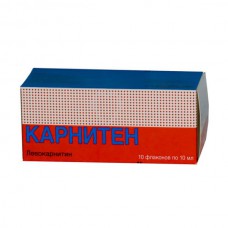Expiration date: 05/2026
The composition and form of issue:
Solution for injection. 1 ampoule contains:
l-carnitine hydrochloride of 1.23 g
(in terms of l-carnitine — 1 g)
excipients: water for injections to 5 ml
in the dark lighting glass ampoules to 5 ml, in a contour acheikova package 5 PCs. in cardboard pack 1 pack.
The oral solution. 10 ml contains:
l-carnitine 1 g
excipients: acid d,l-malic (2-hydroxybutanone) sodium benzoate sodium saccharin dihydrate distilled water
in glass vials of 10 ml box of 1 bottle.
Chewable tablets, 1 tablet contains:
l-carnitine 1 g
excipients: flavor, mint flavor licorice sucrose magnesium stearate
the strip 2 PCs. in cardboard pack of 5 strips.
Indications:
Deficiency of carnitine after dialysis.
Solution for injection: secondary carnitine deficiency — congenital (organic aciduria) acquired alimentary (malabsorption, intestinal disease), an incomplete synthesis in the body, is extremely high endogenous the body's need for carnitine (pregnancy, ischemic lesion), the active elimination (hemodialysis), violation of its reabsorption in the kidneys (CRF).
Violation of metabolism in the myocardium in case of ischemic cardiomyopathy: angina, acute myocardial infarction, as expressed hypoperfusion due to cardiogenic shock.
Solution for oral administration, pills: primary and secondary carnitine deficiency, manifested myopathic syndrome (muscle weakness, hypotonia and atrophy, myalgia, reduced tolerance to physical stress), lesions of the Central and peripheral nervous system (respiratory distress syndrome, impaired psychomotor development, seizures, ataxia, pyramidal disorders, disorders of the oculomotor nerve (external ophthalmoplegia, ptosis, etc.), polyneuropathy, liver (progressive hepatomegaly, liver fibrosis, liver failure phenomenon), heart damage (cardiomyopathy ischemic: angina, post-infarction conditions), kidney damage (Fanconi triad (phosphaturia, glucosuria, and further aminoaciduria), endocrine disorders (growth retardation, hypoglycemia), lesions of auditory (sensorineural deafness), lesions of vision (optic nerve atrophy, pigmentary retinal degeneration, cataract), disorders of the gastrointestinal tract (repeated vomiting, diarrhea).
Contraindications:
Hypersensitivity to the drug.
Application of pregnancy and breast-feeding:
Possible.
Side effects:
Digestive disorders (after ingestion), lungs myasthenic symptoms (patients with uremia).
Drug interactions:
Is not installed.
Method of application and dose:
V/V, solution for injection
A secondary deficit in gemodialise: 2 g (2 amp.) per day in/in slowly after hemodialysis.
Acute myocardial infarction: the daily recommended dose is 100-200 mg/kg (1 to 2 ml), 4 slow intravenous injection, or continuous on/in the introduction within the first 48 hours with subsequent dose reduction in 2 times before the end of the patient's stay in the cardiology Department.
Next, go to the oral administration of from 2 to 6 g (20 to 60 ml of oral solution or 2 to 6 table.) a day on doctor's orders, depending on the severity of the pathology. In cardiogenic shocks in/in the introduction should continue to exit this state.
Inside, solution for oral administration. The contents of the vial with a single dose to be dissolved in a glass of water. To take regardless of the meal.
Primary and secondary deficits in genetic disorders: the daily dose depending on the age and body weight — from 0 to 2 years recommended 150 mg/kg (1.5 ml solution), from 2-6 years — 100 mg/kg (1 ml solution), from 6 to 12 years — 75 mg/kg (0.75 ml), from 12 years and adults — 2 to 4 g (20 to 40 ml) depending on severity of pathology and the doctor's recommendations.
A secondary deficit in gemodialise: 2 to 4 g daily (20 to 40 ml).
Angina and post-infarction conditions: 2 to 6 g daily (20 to 60 ml) as recommended by the doctor.
Inside, chewable tablets, regardless of the meal.
Primary and secondary deficits in genetic disorders: a daily oral dose depending on the age and body weight ranging from 3-6 years — 100 mg/kg, from 6 to 12 years: 75 mg/kg, from 12 years and adults — 2 to 4 g (according to severity of pathology and the doctor's recommendations).
A secondary deficit in gemodialise: 2-4 g per day.
Angina and post-infarction status: 2-6 g per day according to doctor's recommendation.
Overdose:
Not marked.
Precautions:
In the treatment of patients suffering from diabetes and receiving insulin or oral antidiabetic agents, should monitor blood sugar levels timely for dose adjustment of antidiabetic agents.
It should be borne in mind that the chewable tablets contain sucrose.
Cases of addiction or metabolic dependencies not installed.
Special instructions:
Should not be used after the date printed on the pack.
Review:
Office in Russia: Pharma Riace Ltd, www.pharmariace.ru.


